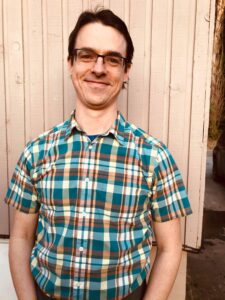When Quinn Morley learned three years ago about a discovery of possible liquid water on Mars, he wanted to find it.
“I realized that no one on our planet had any idea how to get to that water in order to sample it,” he said. “That meant I was at the same place on the problem intellectually as the experts were.”
Morley and his colleague, Tom Bowen, both undergraduates in WSU’s mechanical engineering at Olympic College-Bremerton program, have received a $125,000 grant from NASA’s Innovative Advanced Concepts (NIAC) program to study their idea for an autonomous drill for Mars exploration. They’re one of 16 groups from throughout the U.S. and are the first undergraduate team ever to receive a grant from the program, which supports early-stage research into futuristic space ideas.
While scientists have determined that there might be liquid water underneath the polar ice on Mars, no drilling system exists to drill down the approximately one mile to get to it.
The Mars ice isn’t like ice on Earth, Morley said. It includes layers of dust and ice that also may have rocks or corrosive brines in it. If one tried to use a traditional drilling rig, one would need to bring a mile of steel cable from Earth plus a replacement or two.

“It is, quite frankly, an engineering nightmare,” Morley said. “I figured a traditional deep drilling approach would be useless.”
The most cutting-edge probe to date has only been able to dig about eight inches, and there are no technology-ready deep drills that have been proposed to NASA.
As soon as he learned about the possibility of water on Mars, Morley, a junior, began building a mockup rover “to support the testing of a drill that I hadn’t invented yet.”
Later, he learned about the NASA grant program and, with Bowen, started a space company, Planet Enterprises, so that he could apply.
Morley has worked for more than a decade in aerospace fabrication at Boeing while working on his college degree.
“I am interested in solving big engineering challenges in unique and innovative ways,” he said.
Bowen, a senior in the WSU program, worked for 15 years in the Navy’s nuclear submarine program where he gained experience in working with complex mechanical systems, programming, and embedded systems.

“I’ve always been a tinkerer, and I never let a good research project go to waste,” he said.
The drilling system the student team is proposing would use self-contained, one-meter-long robots, or “borebots,” to drive up and down a borehole with a Perseverance-type rover as a drill rig. About a dozen of the small borebots would be deployed one at a time from a tube on the rover deck and would drill down about 150 millimeters on each trip while driving into the borehole.
Using 3D printing, their workshops, and a variety of tools, the two students will spend the next nine months modeling aspects of navigation, drilling, and recovery and developing simple prototypes. If their work is found to be feasible, they can submit a proposal for a larger grant to mature the concept further.
Morley and Bowen hope that their project will lead to more research efforts by undergraduates for the space agency. Morley is encouraging other students with innovative ideas to begin working with the NIAC office to see if their ideas fall within the scope of the program. They also hope that their work someday leads to scientific discovery about Mars and the solar system.
“The first ice core taken could tell us more about the history of Mars than we currently know today,” Morley said. “If we can get to a depth of five or 10 meters, we may be able to cook ancient Martian atmosphere out of the core, which can tell us about Mars’ past in the same way ice cores from Antarctica tell us about Earth’s.”





